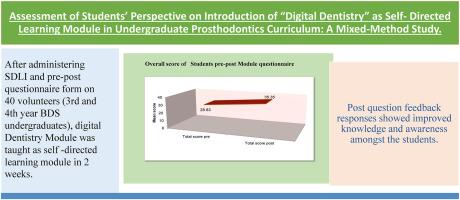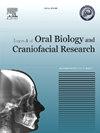学生对大学义齿学课程引入“数位牙科”自主学习模式的看法评估:一项混合方法研究
Q1 Medicine
Journal of oral biology and craniofacial research
Pub Date : 2025-06-22
DOI:10.1016/j.jobcr.2025.06.010
引用次数: 0
摘要
课程设计和实施的创新方法对于满足当今学生的需求至关重要。本研究旨在了解学生的自主学习能力,并确定学生对“数字牙科”模块的看法。方法本研究在获得伦理批准后在医科大学进行。从“口腔外科学士”课程的三、四年级本科生中选择40名志愿者,并获得同意表格。采用预先验证的自我导向学习问卷,了解志愿者的自我导向学习能力。会前编制、验证和管理了一份包含反馈问卷的会前-会后问卷。通过SDL会话将预先设计好的模块应用于志愿者。第一次接触时间为2小时,随后是2周的间歇时间,学生在教师的监督下浏览共享的在线/离线学习材料并参观实验室。结果评估以30个MCQ为基础,根据课程中的3章内容进行。在第二次联系环节,由教师进行汇报,并进行模块后问卷调查。对SDLI、评估问卷和模块前后问卷的反馈进行进一步统计分析。结果学生的SDLI得分中位数为77.325分,成绩较好,其中学习动机得分最高。干预后总分显著提高,平均分由干预前的28.83分(5.43分)上升至干预后的35.35分(4.36分)。结论培训结束后,患者对数字牙科的知识、认知和认知均有显著提高。本文章由计算机程序翻译,如有差异,请以英文原文为准。

Assessment of students’ perspective on introduction of “digital dentistry” as self- directed learning module in undergraduate prosthodontics curriculum: A mixed-method study
Introduction
Innovative approaches to curriculum design and implementation are critical in meeting the needs of today's students. The present study was undertaken to determine the perspective of students on the introduced module of ‘Digital Dentistry’ along with knowing their self –directed learning abilities.
Methods
The present study was conducted in the Medical University after ethical approval was obtained. Forty volunteers from 3rd and 4th year undergraduates of “Bachelor of Dental Surgery” course were selected and consent form was obtained. A pre-validated questionnaire on self-directed learning (SDLI) was administered to the volunteers to know their SDL abilities. A pre-post-session questionnaire containing feedback questionnaires was prepared, validated and administered before the session. A pre designed module was applied on the volunteers by using SDL session. 2 h duration of First contact session followed by 2 weeks of intersession period, where student went through the shared online/offline study material and visit to the lab under faculty supervision. Outcome assessment was done with 30 MCQ based on the 3 chapters taught in the session. In Second contact session, debriefing by faculty was done and post-module questionnaire was administered. The responses obtained from SDLI, assessment questionnaires and pre-post-module questionnaires were further analyzed statistically.
Results
Student's SDLI score with median value of 77.325 represented a good score, with learning motivation scored highest in SDLI. The total score significantly improved post-intervention, with the mean score increasing from 28.83 (5.43) pre-intervention to 35.35 (4.36) post-intervention.
Conclusion
Significant improvement in knowledge, awareness and perceptions of digital dentistry was seen after the conduct of the session.
求助全文
通过发布文献求助,成功后即可免费获取论文全文。
去求助
来源期刊

Journal of oral biology and craniofacial research
Medicine-Otorhinolaryngology
CiteScore
4.90
自引率
0.00%
发文量
133
审稿时长
167 days
期刊介绍:
Journal of Oral Biology and Craniofacial Research (JOBCR)is the official journal of the Craniofacial Research Foundation (CRF). The journal aims to provide a common platform for both clinical and translational research and to promote interdisciplinary sciences in craniofacial region. JOBCR publishes content that includes diseases, injuries and defects in the head, neck, face, jaws and the hard and soft tissues of the mouth and jaws and face region; diagnosis and medical management of diseases specific to the orofacial tissues and of oral manifestations of systemic diseases; studies on identifying populations at risk of oral disease or in need of specific care, and comparing regional, environmental, social, and access similarities and differences in dental care between populations; diseases of the mouth and related structures like salivary glands, temporomandibular joints, facial muscles and perioral skin; biomedical engineering, tissue engineering and stem cells. The journal publishes reviews, commentaries, peer-reviewed original research articles, short communication, and case reports.
 求助内容:
求助内容: 应助结果提醒方式:
应助结果提醒方式:


